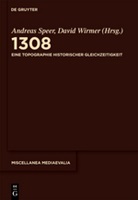Chapter Final Phases of Medieval Hebraism
Jews and Christians between Bible Exegesis, Talmud and Maimonidean Philosophy.
Author(s)
Schwartz, Yossef
Contributor(s)
Speer, Andreas (editor)
Wirmer, David (editor)
Collection
European Research Council (ERC); EU collectionLanguage
GermanAbstract
"The relationship between Jews and Christians and between Judaism and Christianity during the 13th and 14th century is a matter of concrete and contingent historical circumstances; and its ideological elements are inherent in pre-modern Catholicism and pre-modern Rabbinical Judaism. Indeed, both St. Paul and the Rabbis are typical revolutionary figures of late antiquity who present themselves as the authentic interpreters of old sacred writings. Throughout the ages, the interpretation of the Sacra pagina remained at the very center of Chris-tian and Jewish theology involving hidden or manifest polemics against the rival interpretation.
Still, this fundamental and fixed element did not prevent dramatic changes in the concrete historical manifestations of Judaism and Christianity. Nowhere else, the parallel developments in both religions were as spectacular, often even traumatic, as in Italy, France, Spain, and Germany, where Jewish communities had existed since late antiquity; and where Jews and Christians had developed stable forms of coexistence. These were severely shaken by the dramatic events that marked the ascendancy of European hegemony beginning with the first crusade at the end of the 11thcentury.
"
Keywords
The Year 1308; Johannes Duns Scotus; Philosophy/ in the Middle Ages; History/ in the Middle Ages; Theology/ in the Middle AgesDOI
10.1515/9783110218756.267ISBN
9783110218749OCN
1135850771Publisher
De GruyterPublisher website
https://www.degruyter.com/Publication date and place
Berlin/Boston, 2010Grantor
Classification
History: theory and methods
History and Archaeology
CE period up to c 1500
Medieval Western philosophy


 Download
Download